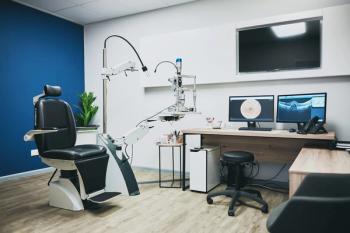
5 lens care tips for traveling patients
Keep your patients in safe and comfortable lens wear while on the road
Many of our patients travel for both business and pleasure. They are traveling across the country and abroad, often spending more time outdoors, in the pool, by the lake or ocean, and in the dry air of an aircraft. Are you talking with your patients about best practices for contact lens wear and care while they travel?
Related:
The annual exam is the perfect opportunity to discuss additional contact lens care and hygiene that may not normally apply while at home. For example, if your patient is traveling to a developing country, it might be best for her to leave her contact lenses at home and just wear glasses. The water quality and other risks of infections could potentially be dangerous for our contact lens-wearing patients. However, we know that most patients want to continue wearing their contact lenses during travel. We need to help them do that safely.
Here are five tips to help keep your patients safe and comfortable when wearing contact lenses. Share them with all of your patients so they’re ready for whenever or wherever they travel.
Related:
1. Pack contact lens gear in a carry-on bag, not checked baggage
This includes glasses, back-up pairs of contact lenses, lens care solutions, and rewetting drops. If all of these items were in checked bags and the patient’s luggage was lost, your patient would be facing the challenge of contacting your office for additional trial contact lenses or to have a copy of the prescription sent to her location.
This huge hassle can be prevented by recommending patients to carry their eyecare necessities on the plane with them. Be sure to offer trial-size bottles of lens care solutions and rewetting drops.
2. Recommend patients travel with daily disposables
Even if your patients wear only monthly or two-week lenses, recommend a 30-day supply of daily disposables in conjunction with their current lenses when purchasing. Having a supply handy just in case a lens is lost down the drain or rips can save an annoying situation.
In addition, wearing daily disposables for activities such as swimming, hiking, biking, and more makes lens wear and care much easier. Patients won’t need to carry solutions or worry about infection or contamination while trying to clean lenses outdoors.
Related:
3. Give patients a copy of their Rx to carry with them
Recommend your patients carry a copy of their prescription for both glasses and contact lenses in case of emergency. Patients won’t be able to get new glasses made or additional contact lenses without a written Rx. This makes life easier with time zone changes or if the emergency happens over a weekend and the assisting doctor can’t reach your office.
Related:
4. Provide trial-sized products for ease of travel
Offer for sale or provide trials of lens care solution and rewetting drops for patients who travel. Full-sized products will need to be stored in checked baggage, and offering the smaller sizes will discourage patients from transferring solutions from a big bottle into a smaller container.
Patients may not understand that pouring solutions from one bottle to another may lead to significant clinical concerns or infections.
In addition, discuss with your patients the benefits of purchasing and packing larger bottles in checked bags if they will be gone for an extended period of time. P
utting off the purchase of lens care products until they reach their final destination may result in purchasing a different product or brand. Switching products could lead to noncompliance or adverse results.
Related:
5. Recommend wearing glasses on the airplane
Planes recirculate air, leading to increased dryness. The lack of moisture results in dry eyes, dry mouth, and dry skin. The longer the flight, the more dry you feel. Add in a nap on the plane, and patients may awaken with dehydrated lenses on their eyes. Recommend patients wait until they reach their destination to wear their contact lenses.
Newsletter
Want more insights like this? Subscribe to Optometry Times and get clinical pearls and practice tips delivered straight to your inbox.





























